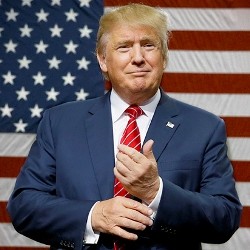Which US Presidential Candidate Is Best for iPoker?

The U.S. Democratic race to the White House is now a two-candidate playing field with Bernie Sanders and Hilary Clinton hoping to secure the nomination. While the Republican side is still a bit more cluttered with candidates, most political experts believe that the race is really down to three men, namely Ted Cruz, Donald Trump and Marco Rubio.
While the candidates are quick to talk on many issues, most of them have offered relatively obscure views when it comes to online gambling legalization in the United States. Still, those who want to vote pro-gambling can look at their records, business dealings and personal beliefs to get some indication on where they may stand on the issue.
– Bernie Sanders defied party lines back in 2006 when the Unlawful Internet Gambling Enforcement Act (UIGEA) was up for an initial vote in the House of Representatives. While many Democrats voted against the bill, Sanders was for it and cast his vote to help ban online poker. Recently, however, there is evidence to suggest that the Vermont Senator has a more neutral view on the issue, and as he stated to media outlet The Hill, which covers news from Capitol Hill in Washington, D.C:
“The essence of the issue here is what role, if any, should the Federal or state government play in regulating Internet activities. My mind is not yet made up on the issue.”
– Hilary Clinton was in the U.S. Senate when the UIGEA was voted on in 2006. Like Sanders, she voted in favor of the law; however, it’s not clear whether she did so to follow the party or not. By the time that the bill reached the Senate, it had broad bipartisan support, so it’s possible that Hilary’s vote was more in league with her colleagues than really against online poker.
– Ted Cruz was not in the U.S. Congress when the UIGEA was passed, and he has never expressed opinions for or against gambling. The Texas Senator, however, is in favor of “States’ Rights, suggesting that he is neutral on the issue, but would not stand in the way of online gambling legislation if it was supported by the state. One complicating factor, though, is his desire to win the Evangelical Christian vote and his association with the Southern Baptist denomination leads many to believe that Cruz would be more inclined to lean against any form of gambling legislation, including online poker.
– Marco Rubio, like Ted Cruz, was not in office for the passage of the UIGEA. However, there is evidence to suggest that he would be morally opposed to online gambling as during a recent town hall meeting he made the following statement:
“I’m very concerned about expanding gaming online. what I don’t want to see is internet casinos, because I’ve seen gambling addiction ruin families, I have seen gambling expansion ruin people’s lives.”
While Rubio’s comment seem to allow leeway for iPoker, the Florida Senator is reportedly close to Sands Corp billionaire Sheldon Adelson, who is one of the most outspoken opponents of online poker legalization in the US. Rumor has it that Adelson prefers Rubio to the other candidates, and it seems unlikely that he would have that opinion if Rubio was adamantly for online poker.
– Donald Trump is the owner of Trump Casinos, and his resorts at one time were involved with online poker. As a result, it would be surprising if he would openly oppose any moves to legalize iGaming. As Trump said in 2011; ” [iGambling] has to happen because many other countries are doing it and like usual the U.S. is just missing out.”
At the same time, though, it’s rumored that Sheldon Adelson had a meeting with Trump back in January, so it’s possible that he, too, could have been persuaded against backing online poker legalization.
Looking Ahead
Of course, many experts believe that online poker legalization will continue to be primarily a state-level issue for the near future. As a result, those concerned about legalization will want to find out where the candidates for their state governments stand on the issue.










